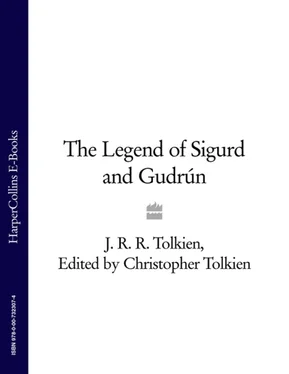J. Tolkien - The Legend of Sigurd and Gudrún
Здесь есть возможность читать онлайн «J. Tolkien - The Legend of Sigurd and Gudrún» — ознакомительный отрывок электронной книги совершенно бесплатно, а после прочтения отрывка купить полную версию. В некоторых случаях можно слушать аудио, скачать через торрент в формате fb2 и присутствует краткое содержание. Жанр: Старинная литература, на английском языке. Описание произведения, (предисловие) а так же отзывы посетителей доступны на портале библиотеки ЛибКат.
- Название:The Legend of Sigurd and Gudrún
- Автор:
- Жанр:
- Год:неизвестен
- ISBN:нет данных
- Рейтинг книги:5 / 5. Голосов: 1
-
Избранное:Добавить в избранное
- Отзывы:
-
Ваша оценка:
- 100
- 1
- 2
- 3
- 4
- 5
The Legend of Sigurd and Gudrún: краткое содержание, описание и аннотация
Предлагаем к чтению аннотацию, описание, краткое содержание или предисловие (зависит от того, что написал сам автор книги «The Legend of Sigurd and Gudrún»). Если вы не нашли необходимую информацию о книге — напишите в комментариях, мы постараемся отыскать её.
The Legend of Sigurd and Gudrún — читать онлайн ознакомительный отрывок
Ниже представлен текст книги, разбитый по страницам. Система сохранения места последней прочитанной страницы, позволяет с удобством читать онлайн бесплатно книгу «The Legend of Sigurd and Gudrún», без необходимости каждый раз заново искать на чём Вы остановились. Поставьте закладку, и сможете в любой момент перейти на страницу, на которой закончили чтение.
Интервал:
Закладка:
But the text as it stands in the Codex Regius, with its clearly corrupt, defective or unintelligible lines or stanzas, its incompatible additions, its strange variations in metre, has inevitably given rise over many years to a great deal of discordant critical analysis. Here I need say no more, however, than that my father tentatively interpreted the state of Atlakviða as the reworking of an earlier poem, a reworking that had then itself undergone ‘improvements’, additions, losses, and disarrangements.
Following Atlakviða in the Codex Regius is Atlamál , the longest of all the heroic poems of the Edda. Whether or not the author of this poem was familiar with Atlakviða (my father thought it improbable) it is decidedly later, and if it tells the same story and keeps the old names, it has nonetheless undergone an extraordinary imaginative transposition: it could be said that the story has been removed from the Heroic Age and re-established in a wholly different mode. Concerning this my father wrote: ‘ Atlakviða seems to preserve a most primitive (unelaborated and unaltered) version of events. There is still a sense of the great kingdom of Atli, and the wide-flung conflicts of the ancient heroic days; the courts are courts of mighty kings – in Atlamál they have sunk to farmhouses. The geography, vague of course, is in keeping: the Niflungs ride fen and forest and plain to Atli (in Atlamál they seem only to row over a single fjord). We may notice also the old traditional vin Borgunda of Gunnar, and the Myrkviðr (‘Mirkwood’) specially associated with ancient Hun-stories’ (see the notes to the Lay of the Völsungs VII.14 and 15). But in Atlamál , while the old ‘plot’ survives, the sense of an archaic and distant world, passed down through many generations, has altogether disappeared. And with it has gone altogether the hoard of the Niflungs and Atli’s greed.
3–4, 6 These stanzas echo in their language the verses that Gunnar sang when he first came to the halls of Gjúki, and use several of the same phrases: see the Lay of the Völsungs, VII.14–15 and notes. Gunnar was recalling the earlier wars of Goths and Huns (14), and the battles in which ‘the Borgund lords met Budli’s host’, and slew Budli’s brother (15).
The compiler of the Codex Regius wrote a prose passage entitled Dráp Niflunga ‘The Slaying of the Niflungs’, evidently intended as an introduction to the poem that follows in the manuscript, which is Guðrúnarkviða en forna , the Old Lay of Gudrún. The passage begins thus:
Gunnar and Högni seized all the gold, the patrimony of Fáfnir. At that time there was strife between the sons of Gjúki and Atli: he charged them with the death of Brynhild. This was how they were reconciled: they were to give him Gudrún in marriage – and they gave her a draught of oblivion to drink, before she would consent to be married to Atli.
Here, as in the Old Lay of Gudrún itself, Brynhild is the daughter of Budli, and the sister of Atli. Since in my father’s version of the story Brynhild was not associated with Atli this element is absent from his Lay of Gudrún. ‘There is no trace in Atlakviða of Brynhild and all that complication,’ he wrote, ‘and in so far as the motive is apparent – it is not explicit – it is the greed of Atli and the cursed hoard that are at the bottom of the trouble.’ On the drink of oblivion see the note to 17–28.
10–16 Atlakviða and Atlamál do not take up the story until the coming of Atli’s messenger to the Gjúkings. The primary source for the story of Gudrún after the death of Sigurd is Guðrúnarkviða en forna (which has the story that Sigurd was not murdered in his bed but out of doors, see the note to IX.51–64 in the Lay of the Völsungs). In this poem Gudrún looks back in lamentation, and tells how she went and sat at night by the body of Sigurd where it lay in the forest; from there she wandered on and came at last to Denmark. It was in Denmark with Thora Hákon’s daughter that the tapestry was woven, and it was there that Gunnar and Högni came to her, together with Grímhild.
In the Lay (stanza 2) Gudrún is said to have gone ‘witless wandering in woods alone’, and when Grímhild and her sons found her she was still living alone, and weaving her tapestry in a ‘woodland house’ (10).
In the brief text (iii) concerning this poem given on pp.52–53 my father wrote: ‘Gudrún did not take her own life, but for grief was for a time half-witless. She would not look upon her kinsmen nor upon her mother, and dwelt apart in a house in the woods. There after a while she began to weave in a tapestry the history of the Dragon-hoard and of Sigurd.’ Thus the introduction of the tapestry in the Eddaic poem became a device, having a wholly different content, to link Guðrúnarkviða en nýja to Völsungakviða en nýja .
17–28 An important element in Guðrúnarkviða en forna which is absent from the Lay of Gudrún is the draught of forgetfulness given to Gudrún by Grímhild, intent on making her forget her injuries and consent to be wedded to Atli. In the poem, followed by the Saga, several stanzas are devoted to Grímhild’s potion, and its curious ingredients enumerated at length. But very strangely, the draught has no effect on Gudrún’s mind: in the verses that follow she fiercely withstands Grímhild’s persuasions; and it has been commonly supposed therefore that stanzas have been disordered, those referring to the potion being placed too early.
My father did not accept this explanation. The first draft of oblivion, administered by Grímhild to Sigurd, he believed to have been invented ‘to account for the difficulties raised by the previous betrothal of Sigurd and Brynhild’ (see p.244). ‘Here,’ he wrote, ‘we have the same mechanism again resorted to – and I think deplorably: for the mere repetition is distasteful, these drinks of Grímhild are too powerful or too powerless: why not give one to Atli too, and make him forget the Hoard!’
He thought it very probable that the stanzas relating to Grímhild’s drink of forgetfulness was an interpolation by a later hand. In his Lay of Gudrún it is gone, and Gudrún (as is seen from stanza 28) submitted without sorcery to the strength of purpose of her formidable mother. In the Saga her last words to Grímhild were ‘Then so it must be, but it is against my will; and no joy will come of it, but rather grief.’
22 Gudrún’s dream is repeated from the Lay of the Völsungs, VII.2–4; lines 5–8 of the present stanza, referring to Atli, are repeated from VII.4, with change of ‘A wolf they gave me’ to ‘A wolf thou gavest me’.
23 ‘boot’: remedy.
24 ‘dreed’: endured (as in the Lay of the Völsungs, VIII.4).
29 ‘of gold he dreamed him’: this is a relic, apparently, of an old impersonal construction of the verb ‘dream’: ‘he dreamed of gold’. These lines reappear in stanza 33.
32–34 In Atlamál the life of Atli and Gudrún has been a horror of hatred and dissension; stanzas 32 and 34 of the Lay suggest rather the story glimpsed in Atlakviða, where when Gudrún stabs Atli in his bed it is said:
‘Often had the ways of love been better, when those twain were wont many a time to embrace before their noble court.’ In the Lay of Gudrún Atli is explicitly presented as torn between his love of Gudrún and his desire for the Niflung hoard.
35 In Atlamál (followed by the Saga) Gudrún overheard what Atli and his men said together in secret; in the Lay this is changed to her overhearing what Atli muttered in his sleep.
36 ‘kith’: friends, neighbours, acquaintance (the original sense of the word in the phrase ‘kith and kin’); again in stanza 40.
Читать дальшеИнтервал:
Закладка:
Похожие книги на «The Legend of Sigurd and Gudrún»
Представляем Вашему вниманию похожие книги на «The Legend of Sigurd and Gudrún» списком для выбора. Мы отобрали схожую по названию и смыслу литературу в надежде предоставить читателям больше вариантов отыскать новые, интересные, ещё непрочитанные произведения.
Обсуждение, отзывы о книге «The Legend of Sigurd and Gudrún» и просто собственные мнения читателей. Оставьте ваши комментарии, напишите, что Вы думаете о произведении, его смысле или главных героях. Укажите что конкретно понравилось, а что нет, и почему Вы так считаете.












